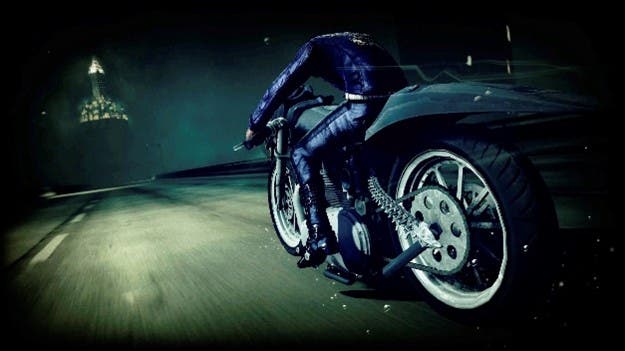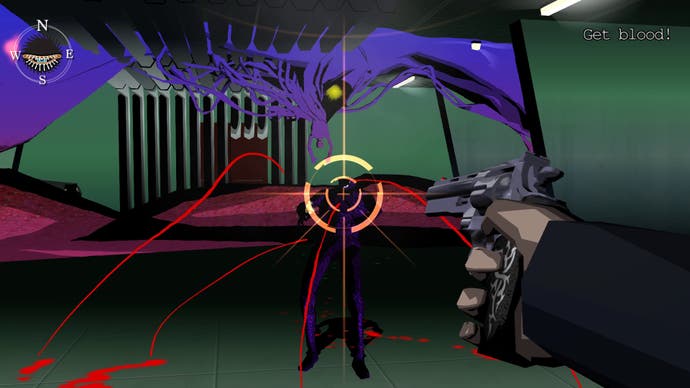Shinji Mikami and Goichi Suda on Shadows of the Damned remastered, Killer 7, and a Sweet Home remake
Could Dino Crisis return?
Shinji Mikami and Goichi Suda are two titans of Japanese game development with some incredible games between them, including the likes of Resident Evil, Dino Crisis, and Killer 7.
Known for their somewhat punk attitude, the pair joined forces on Shadows of the Damned, released on PS3 and Xbox 360 back in 2011. Now it's getting re-released as Shadows of the Damned: Hella Remastered.
That afforded me some time at Gamescom to speak to Mikami and Suda about their work together, the importance of remasters as part of game preservation, and if there are any games from their past they'd be keen to remake. They certainly had a lot of banter between them.
And of course, I had to ask Mikami about a new Dino Crisis game too.
How has it been working together again on Shadows of the Damned? It seems like, from the trailer [above] with all the different job titles, you have a very distinct sense of humour.
Suda: Actually, it's simply a remaster of the original, and as far as all the actual development work and everything, that's all been done by us at Grasshopper. Mikami is pretty much coming along with us for promotions, like a special guest, doing interviews and stuff like that. So it's not that we worked together doing the remaster. It's mostly a Grasshopper thing, but he's come along for the ride.
When we made the trailer, we decided to screw around a bit, and add the names in a bunch of times and a bunch of different job titles. For Mikami the way we did it was with each title it gets more and more impressive. And for the Suda titles, they get more and more low level and crappy. We just decided to have a bit of fun with that and we thought it worked out pretty well.
What has this remaster allowed you to achieve that you couldn't when you made it previously?
Suda: One of the things we were able to add to the remaster is the new costumes for Garcia, the main character, and one of them is called Demonio Garcia, which is basically Garcia kind of demonised. This is something we wanted to do with the original game, something that was influenced by Mikami's God Hand where enemies power up as they go along. And originally I thought, 'Oh, I'd like to do this with Garcia as well'. But when we made the original version, we simply didn't have the time to add that in. So it got scrapped. But this time we were able to add that. And so for that specific costume, Garcia not only has a different costume, but he actually also powers up a bit too. Another thing we originally wanted to go with, but weren't able to, was New Game Plus. Once you clear the game you'll be able to start over from the beginning with all the different power ups and weapons that you had when you finished. Those are the two main things that we really wanted to do with the original and we're finally able to realise now.

When it comes to remastering old work, how tempting is it to want to change things a lot? And how do you balance changes with preserving the original experience?
Mikami: Once I create a game and finish making it, I gradually tend to lose interest in it. And so, going back to remaster or something, there aren't really a whole lot of things I'm like, 'oh, I want to change this, I want to add this'. I'm much more interested in making something completely new.
Suda: There wasn't really a whole lot that I wanted to change about the original, apart from adding a new game plus mode and costumes, but one thing that I wanted to change was the way the cutscenes were done. In the original they were all pre-rendered, and for the remaster, we have them all done in real time instead. Especially with the costume changes, it was a lot of work and there were a lot of moving parts that had to be dealt with. One of our staff members, [Nobutaka] Ichiki, he oversaw that and did a really good job, and basically nailed that. But yeah, it's not exactly an answer to your question, but that's one thing I wanted to change actually.
Ichiki: In the original due to issues with memory and processing and stuff, about 30 percent of the cutscenes were all pre-rendered. But this time we were able to make all the cutscenes fully in real time.
So that gives a more consistent experience?
Suda: That's exactly right. To be honest, I didn't really have very high expectations for how it was going to turn out, but [Ichiki] just went ahead and did it anyway, and he ended up nailing it. At first I even tried to stop him. I was like, 'oh, man, that's not even going to be possible. What are you talking about? Just don't do that'.
Ichiki: Yeah, I underestimated how much actual work it was going to take and how difficult it was going to be, but we somehow made it work out in the end.
Suda: He really ended up going through hell fixing that!

More generally speaking, I want to ask you both about the nature of remasters and remakes in terms of game preservation. How important is it for both of you that all of your past work is still playable now?
Mikami: 10+ years ago, when we made the original [Shadows of the Damned], the tempo of the action in the game was something really special, and revisiting it again it made me remember, 'Oh, wow, this was really special for the time'. And that's one of the things in particular that I wanted to make sure to preserve with this remaster. It's also one of the things we hope to get new players, players who haven't actually played the original, to get to get to experience just like people got to experience when it first came out.
Suda: Grasshopper has been around for 26 years now, and one of the things that we discussed with Netease when we first joined their group was having an actual playable catalogue, making sure past titles that have fallen off would still be playable now and in the future. I think remasters and remakes are really important for that. Thankfully, Steam is also really great for that as well - if you can get your game up on Steam, then you can go back and play it pretty much any time. One thing that's really important to us is making sure, again, that our games are continually playable from here on out. We want to make sure to leave them for future players. Now the game is made it's a part of gaming history, so we think it's really important to preserve that.
With that in mind, do you think it's better to preserve that original experience, even if it wasn't perfect, or to do a new remake? Which approach do you think is best?
Mikami: I feel that if we're going to remake or remaster a game according to modern day standards, then it's important to change what needs to be changed in order to keep it up with modern day standards, SSL related stuff, stuff like that. I feel it's important to make sure that it's up to standard for whatever era people are playing.
Suda: Definition-wise, there's a pretty big difference between a remaster and remake. And as Mikami said, if we're going to redo something to keep up to the standards, then it's important to change things that need to be changed. But to be honest, I feel like I don't really fully grasp the essence of modern day standards and what people think is best, and what people are looking for these days. I feel like, personally, that part of me hasn't really changed over all these years. So if we're going to revisit an old title and bring it up to modern platforms or modern standards, if there are things that I want to change then I'd rather do a full on remake instead of just a remaster. But as far as just preserving the game goes, I'd rather stick with the remaster and keep things as similar as possible.

Are there any other games from your past, either of you, that you would like to revisit in this way?
Mikami: Personally I'd be up to do remakes of some of my old titles, but I'm not really interested in doing remasters of any them.
Suda: So if you were going to remake a game what would you remake?
Mikami: Nothing! [Suda laughs] Once I make a game, I really don't want to do it over again. So there's nothing that I'd like to remake out of games I made myself, but there's a game called Sweet Home that was actually made by somebody else. Since it wasn't something that I made myself, I'd be interested in doing a remake of that. But as far as stuff that I made myself, I don't want to bother revisiting it again.
And Suda-san? I really enjoyed Killer 7 so would love to see more of that.
Suda: That's something we've been talking about for a long time, something that we are definitely interested in. Pretty much every time [Grasshopper talks with Netease], we talk about, 'hey, maybe we should go talk to Capcom and see if we could do something about that'. But that's definitely something we'd be interested in.


